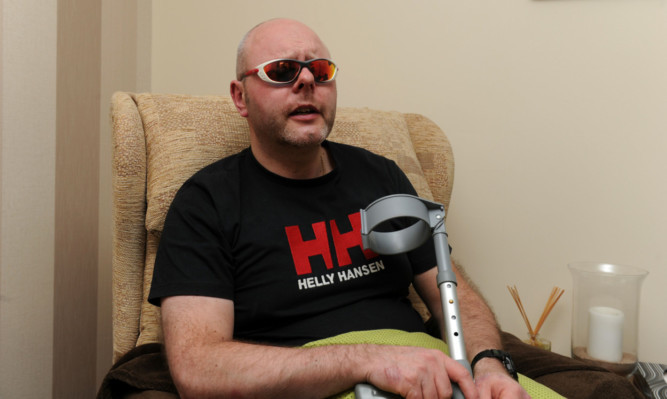A dying Angus man believes specialists who make a wrong diagnosis should be hit in the pocket.
Keith Swankie, 43, a former supermarket manager from Arbroath, has the rare and fatal neurological disease progressive supranuclear palsy (PSP).
Mr Swankie was finally diagnosed in April 2012, more than two years after suffering from eye problems, and the life expectancy from onset is thought to be around eight years.
He said: “When I was working as a supermarket manager, if a cashier was found guilty of selling alcohol to an underage person they were the one who was fined, along with the company.
“Put that into healthcare and that would bring focus to the individuals.”
He was speaking after a leading expert from Stirling University called for GPs to be sued for failing to diagnose dementia. Professor June Andrews urged families who suffered a delayed diagnosis to take legal action against their family doctors.
“I don’t think GPs should be sued, as they are general tradesman, if you like,” Mr Swankie said. “However, specialists who misdiagnose should be taken to task. I believe the GMC should deal with them and fine for misdiagnosis and perhaps the revenue generated could go to the relevant charity.
“A league table on the GP’s performance should also be available, to allow patients the choice to see another consultant if the one they are referred to has a poor performance. This would sharpen their awareness, as too many of these consultants are on huge money and do private work, too, which may impact on their NHS performance.
“With reference to myself, even when my original consultant was given the facts, he was adamant he was right and how dare his wisdom be challenged.
“So I believe the fat cats of the industry should be reined in and managed instead of believing in their own self-importance.”
PSP is caused by the progressive death of nerve cells in the brain, causing difficulty with balance, movement, vision, speech and swallowing.
Mr Swankie had to give up work and the family faced worrying financial times as a result of his insurer’s initial refusal to pay out on critical illness cover.
